One of the largest food companies in the world. The role of the Tyson Foods CEO is not just a title—it’s a dynamic position that has shaped the company’s growth and tackled challenges head-on. From its humble beginnings in Arkansas to becoming a global protein powerhouse, Tyson Foods owes much of its success to visionary leadership.
This article dives deep into the history, strategies, and milestones achieved under the guidance of its CEOs. Whether you’re curious about their leadership strategies or the hurdles they’ve faced, this is your go-to guide for understanding the impact and evolution of Tyson Foods’ leadership.
History Of Tyson Foods Leadership
The leadership history of Tyson Foods paints a vivid picture of its transformation from a small poultry business into a global powerhouse. Over the decades, the company transitioned from a family-operated model to a professionally managed corporation, each phase marked by unique strategies and challenges. Let’s delve into the pivotal eras that shaped its journey.
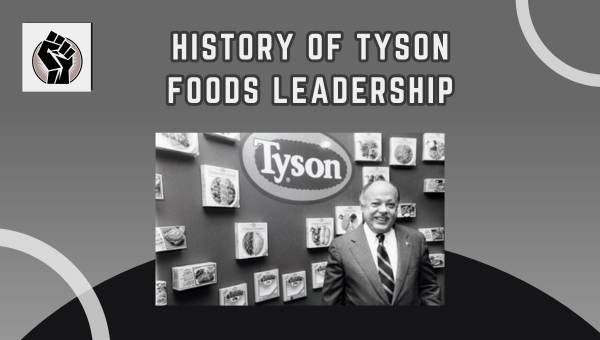
The Founding Era And Early Leadership
Tyson Foods traces its roots back to 1931 when John W. Tyson began his humble journey in Arkansas by delivering chickens during the Great Depression. His leadership style emphasized vertical integration, a strategy that allowed the company to control every step of the production process—from feed supply to final distribution. This approach was revolutionary for its time and laid the foundation for the company’s future growth.
John’s focus on quality and efficiency helped Tyson Foods establish a strong foothold in the poultry industry, making it a trusted name in the market. His vision and innovative thinking were instrumental in transforming a local chicken delivery business into a scalable operation.
Transition To Professional Management
The late 1960s marked a turning point for Tyson Foods when John W. Tyson’s son, Don Tyson, took over the reins following his father’s unexpected passing. Under Don’s leadership, the company embraced professional management practices, signaling a shift from family-led operations to a more structured corporate approach.
Don Tyson’s era was characterized by aggressive expansion, including strategic acquisitions that positioned the company as a dominant player in the protein industry.
He introduced modern management techniques and streamlined operations to ensure the organization could compete on a larger scale. This transition not only diversified Tyson Foods’ portfolio but also solidified its reputation as an adaptable and forward-thinking enterprise.
Notable Tyson Foods CEOs
The leadership at Tyson Foods has been powered by several influential figures, each bringing distinct strengths and strategies to the table. These leaders have played pivotal roles in shaping the company into a global food powerhouse. Below is a detailed account of the most notable CEOs and their contributions.
John W. Tyson (1935–1967)
John W. Tyson was the founder and first CEO of Tyson Foods. He led the company from its inception in 1935 until his passing in 1967. John pioneered the vertical integration model in the poultry industry, allowing Tyson Foods to control every stage of production, from feed manufacturing to distribution.
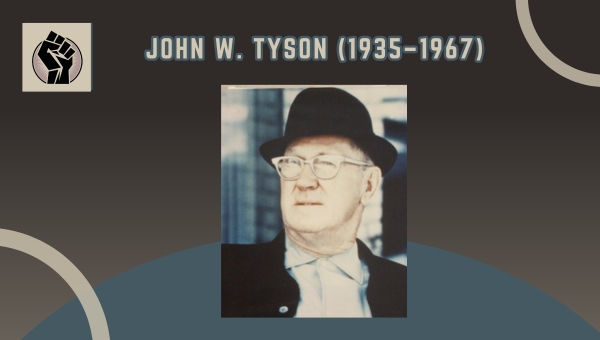
This approach not only minimized costs but also ensured consistent quality, setting the foundation for the company’s long-term success.
Key Achievement: Establishing Tyson Foods as a key player in the poultry industry through innovative strategies and vertical integration.
Don Tyson (1967–1991)
Don Tyson, the son of John W. Tyson, became CEO following his father’s untimely death. Under his 24-year leadership, the company underwent a period of massive expansion, both organically and through acquisitions.
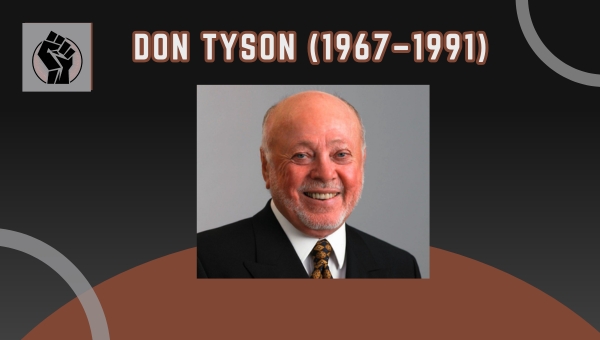
Don’s vision extended beyond poultry, as he diversified Tyson Foods into other protein markets, including beef and pork. His aggressive growth strategies and investments in technology cemented Tyson Foods’ position as a leader in the global meat industry.
Key Achievement: Transforming Tyson Foods into one of the largest protein producers globally through acquisitions and diversification.
Leland Tollett (1991–1998)
Leland Tollett succeeded Don Tyson as CEO during a time of economic uncertainty. He focused on stabilizing operations and strengthening the company’s core products, such as poultry and pork.
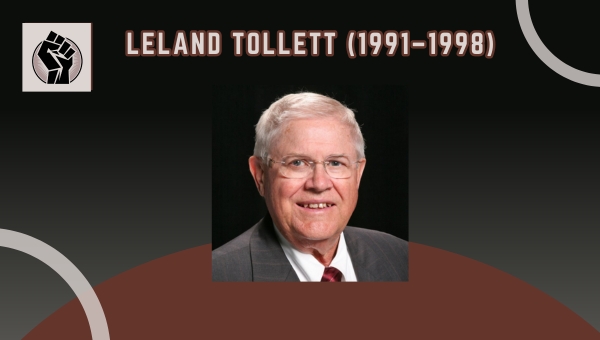
Tollett’s tenure was characterized by steady leadership and operational efficiency. Interestingly, he returned briefly in 2009 to lead the company after Richard L. Bond’s resignation, showcasing his enduring commitment to Tyson Foods.
Key Achievement: Guiding Tyson Foods through economic challenges and maintaining its focus on core product lines.
John H. Tyson (1999–2006)
John H. Tyson, the grandson of the founder, became CEO after Leland Tollett. His leadership emphasized corporate governance and sustainability. He worked to improve Tyson Foods’ public image, introducing initiatives aimed at environmental responsibility and ethical business practices.
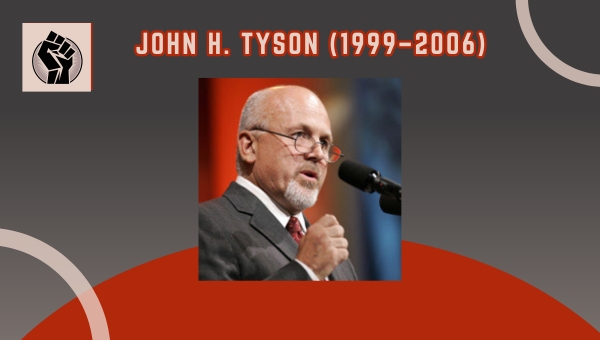
John also oversaw significant acquisitions, including the purchase of IBP in 2001, which expanded Tyson’s reach into beef and pork processing.
Key Achievement: Leading the acquisition of IBP, making Tyson Foods the largest processor of chicken, beef, and pork globally.
Richard L. Bond (2006–2009)
Richard Bond served as CEO during a tumultuous period for Tyson Foods. While he sought to enhance the company’s market presence, his tenure was overshadowed by allegations of unethical practices, including labor-related controversies.
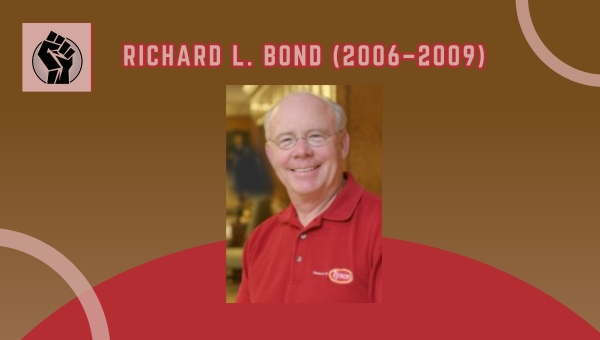
These challenges ultimately led to his resignation in 2009, marking a difficult chapter in the company’s leadership history.
Key Achievement: Despite challenges, Bond worked to drive operational efficiencies during his tenure.
Donnie Smith (2009–2016)
Donnie Smith took over as CEO following Richard Bond’s resignation. His leadership focused on driving growth through operational efficiency and strategic acquisitions.

Donnie also placed emphasis on innovation, expanding Tyson Foods’ product offerings into prepared foods and alternative proteins. However, his tenure was not without criticism, as the company faced scrutiny over worker safety and labor practices.
Key Achievement: Spearheading Tyson Foods’ expansion into prepared foods, significantly diversifying its product portfolio.
Tom Hayes (2017–2018)
Tom Hayes served as CEO for a brief period but left a lasting impression with his focus on product transparency and sustainability.
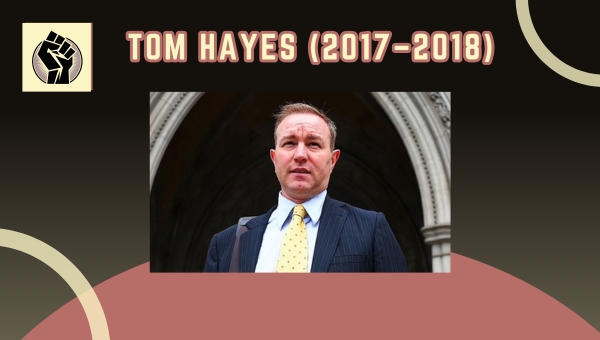
He aimed to align Tyson Foods with changing consumer preferences, emphasizing cleaner labels and environmentally friendly practices. However, his tenure was cut short due to challenges in addressing longstanding ethical issues within the company.
Key Achievement: Advocating for sustainability and product transparency to better align with consumer demands.
Noel White (2018–2020)
Noel White led Tyson Foods during one of its most challenging times, including the COVID-19 pandemic. He focused on navigating lawsuits related to pricing manipulation and expanding the company’s presence in alternative proteins.
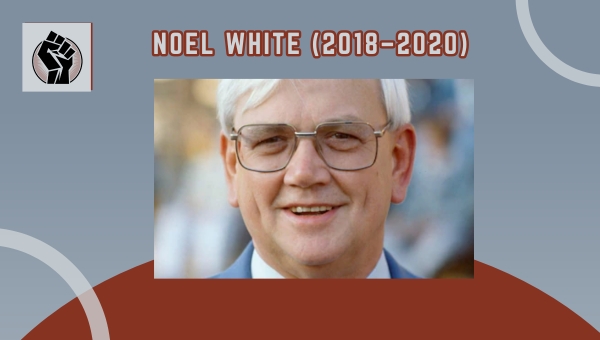
Despite these efforts, his leadership faced criticism over worker safety during the pandemic, highlighting the complexities of managing a global workforce in a crisis.
Key Achievement: Expanding Tyson Foods’ footprint in alternative proteins while managing the company through the pandemic.
Dean Banks (2020–2021)
Dean Banks was tasked with modernizing Tyson Foods during his short tenure as CEO. He emphasized leveraging technology and innovation to streamline operations.

However, his leadership coincided with the peak of pandemic-related challenges, including workplace safety concerns. This led to his resignation after just eight months in the role.
Key Achievement: Initiating modernization efforts to improve operational efficiency despite a challenging environment.
Donnie King (2021–Present)
Donnie King, a long-time Tyson Foods executive, assumed the role of CEO and President in 2021. His leadership has focused on stabilizing operations and addressing ethical concerns, including worker safety and sustainability.

King has also worked to streamline supply chains and drive growth in key markets, ensuring Tyson Foods remains competitive in the global food industry.
Key Achievement: Stabilizing operations and reinforcing Tyson Foods’ commitment to ethical practices and sustainability.
Also Read: CEO of McDonalds: Leadership That Revolutionized Fast Food
Key Milestones Under Different CEOs
Tyson Foods has achieved remarkable milestones across different leadership tenures. Each CEO brought their distinctive strategies, driving the company forward and leaving an indelible mark.

Below are some pivotal achievements that defined these eras:
- Acquisition of IBP (2001)
Under the leadership of John H. Tyson, Tyson Foods made a groundbreaking move by acquiring IBP, Inc. This acquisition positioned the company as the largest processor of chicken, beef, and pork in the world. It marked a turning point, solidifying Tyson’s dominance in the protein industry. - Expansion into Prepared Foods (2014)
During Donnie Smith’s tenure as CEO, Tyson Foods diversified its offerings by entering the prepared foods segment. This strategic move was instrumental in appealing to changing consumer preferences, ensuring the company stayed relevant in a competitive market. - COVID-19 Response (2020)
Noel White’s leadership during the pandemic showcased adaptability. He implemented health and safety measures to protect employees amidst an unprecedented crisis. This proactive approach underscored Tyson Foods’ commitment to operational continuity and employee welfare. - International Growth Initiatives (2006)
During Richard Bond’s time as CEO, Tyson Foods focused on expanding its global footprint. Despite challenges, these initiatives were pivotal in introducing Tyson products to international markets, broadening the company’s reach. - Vertical Integration Strategy (1967-1991)
Don Tyson revolutionized the company by emphasizing vertical integration. This strategy allowed Tyson Foods to control every production stage, from feed to distribution, enhancing efficiency and product quality. - Sustainability Efforts
Across various leadership eras, Tyson Foods has made strides in sustainability. Notably, recent CEOs have prioritized environmental goals, reflecting the company’s efforts to align with evolving consumer and regulatory expectations.
Leadership Strategies And Impact
The leadership at Tyson Foods has consistently shaped the company’s trajectory through strategic decision-making and innovative practices. By addressing growth, ethical challenges, and evolving market demands, the CEOs have played a pivotal role in steering the organization through various landscapes. Below, we delve into key aspects of their leadership approaches.
Growth And Innovation Under Various CEOs
Tyson Foods has seen significant growth under its various leaders, each bringing a fresh perspective to expansion and innovation.
- Don Tyson, for instance, emphasized vertical integration, effectively controlling production from start to finish, which became a cornerstone of the company’s growth.
- Under John H. Tyson, the acquisition of IBP in 2001 marked a transformative phase, establishing Tyson Foods as the largest processor of chicken, beef, and pork globally.
- Donnie Smith championed the diversification of the product range by expanding into prepared foods, ensuring the company met consumer demands for convenience.
These efforts not only boosted Tyson Foods’ market share but also positioned the company as a leader in the food industry. The focus on technology and operational efficiency has been a constant theme, enabling the company to remain competitive amid industry challenges.
Ethical Practices And Controversies
Over the years, Tyson Foods has faced its share of ethical challenges, with leadership often at the center of addressing these issues.
- Concerns about labor practices, such as worker safety, have been an ongoing issue, particularly during crises like the COVID-19 pandemic. Leaders like Noel White implemented health measures to address employee well-being during this challenging period.
- Environmental concerns have also been prominent, with criticisms regarding pollution and resource management. While some CEOs took steps to mitigate these issues, the company has faced scrutiny for its sustainability practices.
- Legal controversies, including accusations of price manipulation and immigration-related lawsuits, have tested the ethical frameworks of Tyson Foods. These incidents underscore the importance of leadership in ensuring transparency and corporate responsibility.
Through these challenges, Tyson Foods has worked to improve its practices, though public and regulatory scrutiny continues to shape its operational strategies.
Response To Market Demands And Trends
Adapting to changing consumer preferences and market conditions has been a hallmark of Tyson Foods’ leadership. CEOs have introduced strategies to align the company with emerging trends and demands.
- The shift toward plant-based protein options highlighted Tyson’s response to the growing demand for alternative proteins. This initiative showcased the company’s willingness to diversify and innovate.
- Global expansion efforts under leaders like Richard Bond aimed to tap into international markets, broadening Tyson Foods’ reach and customer base.
- Recent years have seen a focus on supply chain resilience, with leaders addressing disruptions caused by global events, ensuring the company’s ability to deliver products consistently.
These adaptive strategies demonstrate the importance of aligning business operations with evolving consumer needs and market dynamics, ensuring Tyson Foods remains a key player in the food industry.
Also Read: Taco Bell History – Transforming Fast Food Forever
Challenges Faced By Tyson Foods CEOs
Leading a major corporation like Tyson Foods comes with its own set of challenges. From fierce competition to public scrutiny and environmental concerns, the CEOs of Tyson Foods have had to navigate a complex landscape to keep the company thriving. Let’s explore some of the critical challenges they faced.
Industry Competition
The food industry is fiercely competitive, requiring constant innovation and strategic planning to maintain a strong market position. Tyson Foods’ CEOs have faced significant pressures to outperform competitors and meet evolving consumer demands. Below are some of the challenges they encountered:
- Market Saturation: Competing against established companies and emerging brands in the protein and processed foods sectors.
- Global Expansion Hurdles: Balancing the complexities of entering international markets while maintaining profitability.
- Cost Management: Managing rising production costs while ensuring affordability for consumers, which is critical in a price-sensitive market.
- Product Differentiation: Standing out in a crowded market by introducing unique products that cater to diverse customer preferences.
Handling Public Scrutiny And Legal Issues
Public scrutiny and legal challenges have been a recurring part of Tyson Foods’ journey. CEOs have had to address these issues while safeguarding the company’s reputation. Key challenges include:
- Labor Practices: Allegations of labor violations, including worker safety concerns, have drawn scrutiny and required immediate action.
- Antitrust Lawsuits: Facing legal claims related to price-fixing and market manipulation, which impacted consumer trust.
- Environmental Violations: Managing lawsuits and fines due to alleged environmental damage caused by certain operational practices.
- Crisis Communication: CEOs had to communicate effectively during crises to reassure stakeholders and maintain transparency.
Sustainability And Environmental Concerns
Sustainability has become an increasingly important focus for Tyson Foods, driven by public expectations and industry standards. CEOs have faced challenges in aligning the company’s operations with environmental goals. Here are some of the key efforts and obstacles:
- Reducing Carbon Footprint: Striving to lower greenhouse gas emissions from production facilities and supply chains.
- Water Usage: Addressing concerns about excessive water consumption and contamination in production processes.
- Sustainable Sourcing: Ensuring raw materials like feed are sourced responsibly without harming ecosystems.
- Consumer Perception: Building trust by demonstrating genuine efforts toward achieving sustainability targets while managing operational costs.
Each of these challenges has tested the leadership and adaptability of Tyson Foods’ executives over the years, shaping the company’s path forward.
FAQs
What brands does Tyson Foods own?
Tyson Foods owns several well-known brands, including Hillshire Farm, Jimmy Dean, Ball Park, and Aidells. These brands cover a wide range of products, from ready-to-eat meals to fresh and frozen meats.
Who owns Tyson chicken company?
Tyson Foods is a publicly traded company, meaning it is owned by its shareholders. However, the Tyson family continues to hold a significant stake in the business.
Is Tyson chicken halal?
Not all Tyson chicken products are halal. However, Tyson Foods does produce a limited range of halal-certified products, which are clearly labeled to meet specific dietary requirements.
Conclusion
The journey of Tyson Foods’ leadership showcases a blend of resilience, innovation, and adaptability. From its humble beginnings to becoming a global powerhouse, the company’s CEOs have played pivotal roles in shaping its trajectory.
By navigating challenges, embracing change, and focusing on growth, Tyson Foods has set an example in the food industry. Understanding the leadership strategies and challenges they’ve faced offers valuable insights into corporate success.
For more engaging and informative articles on industry leaders and corporate strategies, explore our site further. Stay informed and inspired by diving into our extensive collection of blogs!





